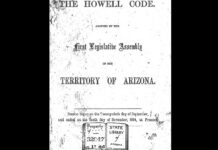
Short-term rentals have been a hot topic in the Village of Oak Creek and Sedona since Arizona Gov. Doug Ducey signed Senate Bill 1350 in 2016. The legislation prohibited cities, towns and counties from banning short-term rentals of residential property in 2016.
At the time, Yavapai County, Sedona, Jerome, Tucson and Bisbee had bans on short-term rentals in place, so the new legislation meant a change in rules for the VOC and nearby communities — though the short-term rental bans were not always strictly enforced.
Local proponents of allowing short-term rentals argued that the change would stimulate the economy and give homeowners more options for using their property.
Love them or hate them, there appears to be little doubt that interest in buying or converting homes and condos for short-term rentals has made waves in the local housing and rental markets since the change in state law.
Consequently, they have been blamed by some for exacerbating a host of local problems, including traffic, lack of workforce housing and lower school enrollment due to long-term rentals being converted to short-term rentals. Residents have also complained that short-term rentals hurt the feel and appearance of neighborhoods
Some Arizona localities, like Sedona, have been lobbying the state legislature to repeal or significantly revise the law to give local governments greater control over STRs.
But one type of organizing body has never had to wait for elected officials to act. The new short-term regulations did not include any language about condominium or homeowners associations, which can enact deed restrictions or covenants, conditions and restrictions.
“It is generally thought … that the legislature’s preemption does not forbid private organizations such as homeowner associations [HOAs] from enacting or enforcing regulations in this area,” a June 2019 blog post from the Sacks Tierney law firm in Scottsdale stated.
Flexing Muscles
HOAs in the Village are using their power to limit short-term rentals.
In 2019, the Pinon Woods III homeowners association amended its CCRs to prohibit home rentals of less than 30 days. To enact the restriction, the HOA had to obtain the consent of 70% of members.
Rentals less than 30 days are also prohibited in the Sedona Golf Resort Community Association, and the HOA has been reminding residents of the ban. A banner at the top of its website declares “Short Term Rentals, less than 30 days, are not permitted.” The same message is written on flyers on bulletin boards throughout the community. The flyer warns members of a $1,000 per day fine for short-term rentals and a $500 per day fine for advertising short-term rentals.
In June, the Village of Oakcreek Association, which has 2,300 homeowner members, increased fines for homeowners violating the HOA’s prohibition of rentals for less than 30 days, raising the fine for violations from $250 per day to $1,000 per day, or twice the rental’s nightly advertised rate, whichever is higher. The HOA also removed the previous limit for maximum cumulative fines for short-term rentals.
VOCA manager Deb Brewer told the association’s finance committee in June that she planned to initiate legal action when a violator’s account reached $10,000 in fines.
Brewer told the VOCA leaders that it is difficult to determine exactly how many properties are being used for short-term rentals, but said, “we have just a handful [of homeowners] that are really causing problems.”
Brewer said that VOCA sends a letter to properties in violation every 10 days.
“I think we have put some pressure on them, and we’ll keep it up, but taking them to court — that’s what’s going to do it,” she said.
HOAs in Arizona have succeeded in defending short-term rental prohibitions in court. The Camelback Country Estates in Paradise Valley succeeded in stopping a short-term rental in 2019 after it took the owner of a 10,000-square-foot home advertised for $2,000 a night to court in Maricopa County.
However, HOAs must cross some hurdles in regulating STRs. An HOA must “clearly and specifically state the restriction [in its CCRs]. Otherwise, short term-rentals will be permitted,” Adam Martinez, chairman of real estate litigation for Rose Law Group, wrote in a blog post.
The need for unambiguous language to uphold bans can be a problem for HOAs that wrote their CC&Rs before the rise Airbnb, VRBO and other popular rental platforms.
Martinez wrote, for example, that HOA rules stating that homes can only be used as a “single-family residence” are not adequate to ban short-term rentals, since courts have ruled that a short-term rental can still fall under the term “single-family residence.”
Many older covenants also prohibit “commercial” use of homes. That’s not clear enough either.
“A CC&R’s prohibition against using a property for any purpose other than ‘residential,’ or using it for any ‘commercial’ purpose, is not sufficient to allow an HOA to stop the use of property as a short-term rental,” Phoenix firm Jaburg|Wilk wrote in a blog post.
VOCA, which approved its short-term rental ban in a 564-452 vote in 2016, uses explicit language in its prohibition: “No Owner shall lease a Lot or a Unit for a Lease term of less than thirty [30] days.”
Pinon Woods III uses similar language: “No transient Lessee shall be accommodated, and Lots shall not be leased for less than thirty [30] days in duration.”
The language in Sedona Golf Resort’s CC&Rs could not be accessed on its website by non-members.
Bob McCann, a member of VOCA’s Architecural Rules & Restrictions Committee before he stepped down this month because he is moving, said another problem for HOAs is identifying and documenting short-term rentals.
They are not always advertised on popular platforms, he said, and some that are listed there are only for one-month minimums, which is allowed by many HOAs. Hotels and condos in commercial zones also advertise on platforms for short-term rentals.
“What people really need to do when there’s a short-term rental, people need to call the [VOCA] office,” he said. “They got to get involved. You can’t expect someone else to do it.”
A recent newsletter from VOCA had a similar message.
“If you wish to report what you believe is a STR infraction, please provide details [written documents, photographs, etc.] showing the events and actions that may have occurred. Proof of violations sufficient for legal proceedings is essential for active enforcement to occur,” the newsletter stated.





















